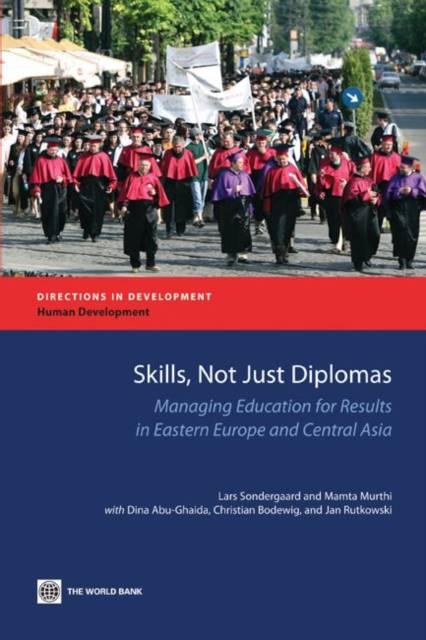
- Retrait gratuit dans votre magasin Club
- 7.000.000 titres dans notre catalogue
- Payer en toute sécurité
- Toujours un magasin près de chez vous
- Retrait gratuit dans votre magasin Club
- 7.000.0000 titres dans notre catalogue
- Payer en toute sécurité
- Toujours un magasin près de chez vous
Skills, not just Diplomas
Managing Education for Results in Eastern Europe and Central Asia
Lars Sondergaard, Mamta Murthi
36,45 €
+ 72 points
Description
Future growth in the countries in Eastern Europe and Central Asia (ECA) will increasingly depend on innovation. And innovation requires skills. This makes it important, as countries plan for recovery, to undertake reforms to reduce the skills shortages that the previous growth episode exposed Education systems have a very important role to play in creating the right skills. But education systems in the region fall short of the demands of their economies in two major ways. The first is that despite high levels of enrollment they do not produce enough graduates with the right skills. Students graduate with diplomas, not with skills, because the quality of the education for many students is poor. In large part this is because education systems remain focused on providing an excellent education to a few at the expense of improving the quality of learning for the majority. Moreover, the systems are still making the transition from teaching the basics to inculcating higher order skills such as critical-thinking and problem solving. The second way in which education systems fall short is that outside of a few countries in the EU there are few opportunities for adults to retrain, or acquire new skills. This book argues that generating more of the right skills requires a fundamental change of approach in the education systems in the region so that they aim for, and deliver, higher quality education for the vast majority of students ("not just diplomas but skills"). To start with, education systems need to "turn the lights on" and take seriously the measurement of what students actually learn as opposed to measurement of the inputs into the education process on the implicit assumption that learning follows. Policy makers also need to move away from the focus on inputs and processes and increase the emphasis on incentives.
Spécifications
Parties prenantes
- Auteur(s) :
- Editeur:
Contenu
- Nombre de pages :
- 268
- Langue:
- Anglais
- Collection :
Caractéristiques
- EAN:
- 9780821380963
- Date de parution :
- 13-10-11
- Format:
- Livre broché
- Format numérique:
- Trade paperback (VS)
- Dimensions :
- 162 mm x 229 mm
- Poids :
- 426 g

Les avis
Nous publions uniquement les avis qui respectent les conditions requises. Consultez nos conditions pour les avis.






